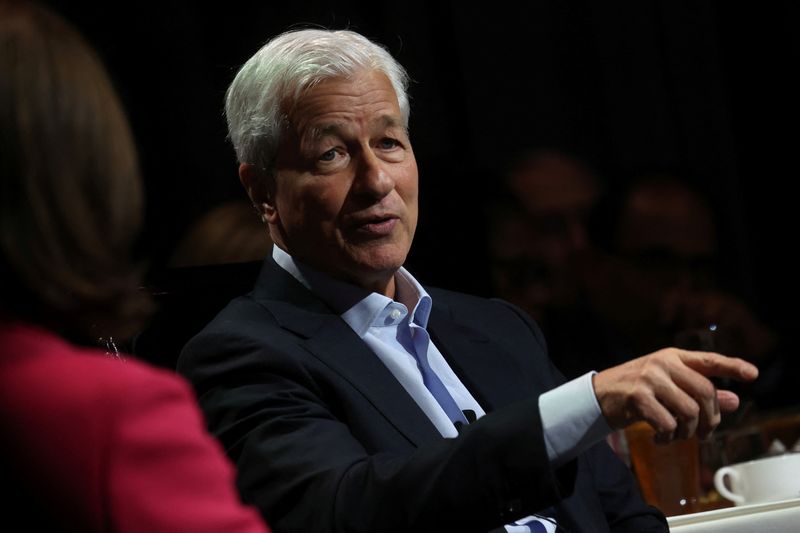By Tatiana Bautzer and Nupur Anand
NEW YORK (Reuters) -JPMorgan Chase CEO Jamie Dimon blasted several major U.S. financial regulatory initiatives on Monday and vowed to oppose those he said would not make banks safer.
The outspoken executive, 68, who runs the largest U.S. lender, criticized what he called overlapping or ill-conceived rules on capital requirements, card payments and open banking.
“It’s time to fight back,” Dimon said at a conference. Many banks are afraid to “fight with their regulators, because they would just come and punish you more,” he added.
“I have been told by people at the Fed, know that because of what you have said and what you wrote about, you know they are coming after you.”
The Federal Reserve declined to comment.
“We are suing our regulators over and over and over because things are becoming unfair and unjust, and they are hurting companies, a lot of these rules are hurting lower-paid individuals,” he said.
As banks await new proposals under what is known as the Basel III endgame, “the devil is in the details,” Dimon said.
He was referring to a proposal by U.S. regulators in July 2023 to align their standards with those of the Basel Committee on Banking Supervision to help the industry better absorb economic shocks.
The Fed’s regulatory chief Michael Barr last month outlined a plan to raise big bank capital by 9%, easing the previous proposal to hike capital 19%. It was a major concession to Wall Street banks that had lobbied to water down the draft.
Despite the apparent industry victory, the plan was still mired in uncertainty, with key details unclear and the Nov. 5 U.S. presidential election casting doubt over whether it would survive a new administration.
It will be difficult to get anything done if the proposals do not emerge before the election, Dimon said.
The capital surcharge for global systemically important banks was among the “stupidest” elements of the Basel framework, its operational risk calculations were “ridiculous,” and there were “inconsistencies” in the liquidity coverage ratio, he said.
“The biggest problem I have with all these overlapping rules is that we are not stepping back and saying, what could we do better to make the system work better,” he added.
Dimon has been floated for senior positions on U.S. economic policy, such as Treasury secretary. Despite opining on what qualities the next president should possess, he has not publicly endorsed either candidate.
The bank chief has been among the most strident critics of regulations and has warned the bank is willing to challenge some rules in court when it sees no other choice.
“It is time to fight back,” Dimon told the American Bankers Association, drawing applause and laughter. “We don’t want to get involved in litigation just to make a point, but if you’re in a knife fight, you better bring a knife and that’s where we are.”
The CEO also said regulators should not allow card-issuing financial services firms such as American Express (NYSE:AXP), Capital One and Discover Financial Services (NYSE:DFS) to charge more for debit card transactions.
This is because banks are limited in how much they can charge for debit cards while card issuers have no such limits.
“It’s grossly unfair to allow them to do more,” he said.
Dimon, the longest running bank chief at a major Wall Street bank, also criticized the top U.S. consumer finance watchdog’s rules unveiled last week which would make it easier for consumers to switch between financial services providers.
The Consumer Financial Protection Bureau’s “open banking” rule governs data sharing between fintech firms and traditional banks, allowing consumers to easily transfer their personal data between providers free of charge.
Dimon said he was not against open banking but noted that it could compromise consumer data and lead to fraudulent money transfers and he was set to fight it.

